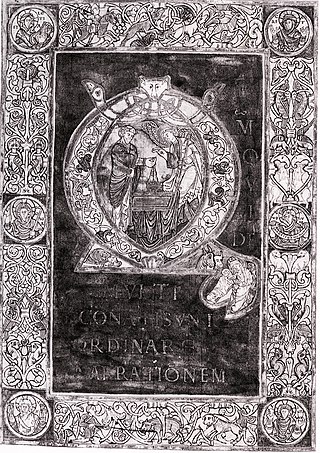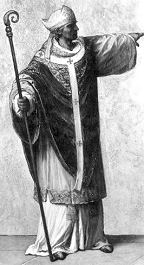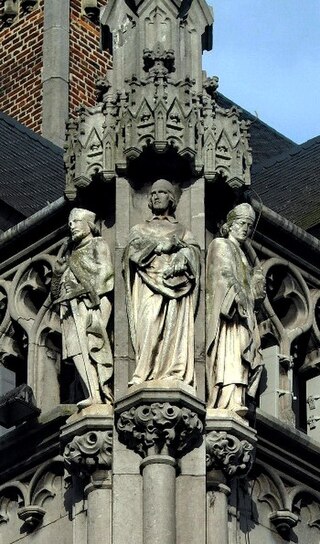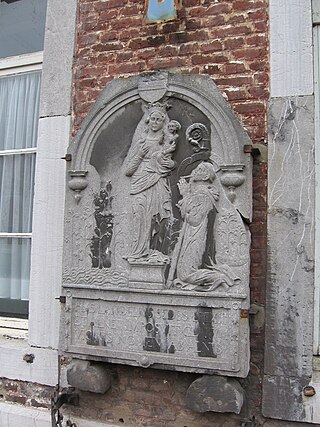
Year 1007 (MVII) was a common year starting on Wednesday of the Julian calendar.

Amandus, commonly called Saint Amand, was a bishop of Tongeren-Maastricht and one of the catholic missionaries of Flanders. He is venerated as a saint, particularly in France and Belgium.
Saint Wolbodo was the bishop of Liège from 1018 to 1021.

Saint Amatus, also called Amatus of Grenoble, Saint Ame, or Aimee, was a Frankish Colombanian monk and hermit. Together with St. Romaric, he founded Remiremont Abbey.

Bertin, also known as SaintBertin the Great, was the Frankish abbot of a monastery in Saint-Omer later named the Abbey of Saint Bertin after him. He is venerated as a saint by the Catholic and Orthodox Churches. The fame of Bertin's learning and sanctity was so great that in a short time more than 150 monks lived under his rule. Among them were St. Winnoc and his three companions who had come from Brittany to join Bertin's community and assist in the conversions. Nearly the whole Morini region was Christianized.

Saint Michael's Abbey is a Benedictine abbey in Farnborough, Hampshire, England. The small community is known for its liturgy, its pipe organ, and its liturgical publishing and printing. This abbey is also known for enshrining a Pontifically crowned image of Saint Joseph.

The Archdiocese of Cambrai is a Latin Church ecclesiastical jurisdiction or archdiocese of the Catholic Church in France, comprising the arrondissements of Avesnes-sur-Helpe, Cambrai, Douai, and Valenciennes within the département of Nord, in the region of Nord-Pas-de-Calais. The current archbishop is Vincent Dollmann, appointed in August 2018. Since 2008 the archdiocese has been a suffragan of the Archdiocese of Lille.

Notkerof Liège was a Benedictine monk, bishop (972–1008) and first prince-bishop (980–1008) of the Bishopric of Liège.

Ratherius or Rathier or Rather of Verona was a teacher, writer, and bishop. His difficult personality and political activities led to his becoming an exile and a wanderer.
Herigerus was a Benedictine monk, often known as Heriger of Lobbes for serving as abbot of the abbey of Lobbes between 990 and 1007. Remembered for his writings as theologian and historian, Herigerus was a teacher to numerous scholars. His biography describes him as "skilled in the art of music", though no music theory treatise survives and neither do the two antiphons and one hymn attributed to him.

Bobbio Abbey is a monastery founded by Irish Saint Columbanus in 614, around which later grew up the town of Bobbio, in the province of Piacenza, Emilia-Romagna, Italy. It is dedicated to Saint Columbanus. It was famous as a centre of resistance to Arianism and as one of the greatest libraries in the Middle Ages. The abbey was dissolved under the French administration in 1803, although many of the buildings remain in other uses.

Lobbes Abbey was a Benedictine monastery in the municipality of Lobbes, Hainaut, Belgium. The abbey played an important role in the religious, political and religious life of the Prince-Bishopric of Liège, especially around the year 1000. The abbey's founding saint is Saint Landelin; four other saints are also connected with the abbey.

Saint Landelin is a saint in the Eastern Orthodox Church and Roman Catholic Church.

Abel served as the Bishop of Reims in Francia, now modern-day France. He has sometimes been venerated as a saint in the Catholic Church, particularly by the Bollandists.
Saint Altfrid was a leading figure in Germany in the ninth century. A Benedictine monk, he became Bishop of Hildesheim, and founded Essen Abbey. He was also a close adviser to the East Frankish King Louis the German.

Theodard of Maastricht was a 7th-century bishop of Maastricht-Liège, in present-day Netherlands. As Theodard was murdered while on his way to protest the plundering of his diocese by Frankish nobles, he is considered a martyr. His feast day is 10 September. Theodard was uncle to his successor Lambert of Maastricht, and therefore brother or brother-in-law to Robert II, Lord Chancellor of France.

Saint Ermin of Lobbes was the second abbot of Lobbes Abbey.

Crespin Abbey was a Benedictine monastery in the commune of Crespin in the department of Nord, France, founded around 648 by the reformed brigand Landelin of Crespin, also the first abbot, and dissolved in 1802.
Erluin was a Benedictine monk, the first abbot of Gembloux (946–87) and also briefly the abbot of Lobbes (956–57). Diametrically opposed accounts of his character are given by the partisans of Gembloux and Lobbes.
Folcuin was a monk at the abbey of Saint-Bertin, where he was a deacon and archivist, and later abbot of Lobbes. He wrote histories of the abbots of both his monasteries.














